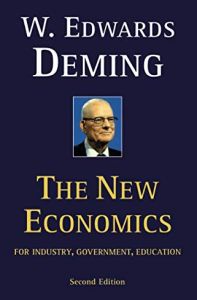Join getAbstract to access the summary!

Join getAbstract to access the summary!
W. Edwards Deming
The New Economics
For Industry, Government, Education
MIT Press, 2000
What's inside?
Listen to “the high prophet of quality control.”
Recommendation
Critique W. Edwards Deming’s work at your peril. After all, he probably set whatever standard you’re using. This volume – revised by the author before his death in 1993 and partially based on his 1950s work with the Japanese – may strike the contemporary reader as a curious mixture of seminal process thinking and idiosyncratic ruminations on education. Portions read like an artifact of the early 1990s, but in this regard, however, his volume offers a unique perspective on a turning point in American economic history: the shift to the knowledge-based economy. Deming’s volume is suited to any serious student of management thought, and all human resources professionals should familiarize themselves with his work, which set the foundations for many of the transformations now underway in the corporate world.
Summary
About the Author
W. Edwards Deming’s consulting practice spanned more than 40 years, including major corporations in virtually every industry. Deming is particularly well known for his work in Japan, where he preached the gospel of improving process and quality. The Japanese proved apt students, much to Detroit’s regret. Deming led the sweeping revolution in quality that helped the U.S. stave off competition abroad and, in 1987, was awarded the National Medal of Technology by President Ronald Reagan.


















Comment on this summary